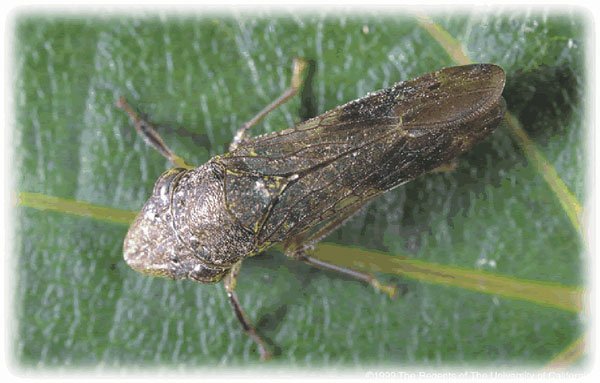Gilroy
– Local winery owners will vote in favor of a referendum that
taxes grape growers to raise money to fight the scourge of the
Glassy-winged Sharpshooter.
Gilroy – Local winery owners will vote in favor of a referendum that taxes grape growers to raise money to fight the scourge of the Glassy-winged Sharpshooter.
“The feeling I have is that there is support for continuing the assessment because if grape growers and people in the wine industry don’t take responsibility to help fund this very important research, the government certainly won’t continue to fund it,” said Valerie Vanni, who with her husband David, owns Solis Winery on Hecker Pass Highway. “If the Glassy-winged gets out of control, the wine industry is in big trouble in our region.”
The Sharpshooter was discovered in California in 1999. The insect preys on a variety of crops but carries a plague, Pierce’s Disease, that is particularly lethal to grapevines. The disease essentially clogs the plumbing in a vine, making it impossible for the fruit to receive water and nutrients.
“It can spread across an entire vineyard very quickly,” said Jay Van Rein, a spokesman for the California Department of Food and Agriculture. “It may take a year or two for the symptoms to show, but once they’re infected, they’re going to die. It’s just a matter of time.”
The referendum will be conducted by mail. A ballot will sent to California’s approximately 6,000 grape growers the week of May 16. Ballots are due by the end of June.
If it passes, the referendum will extend a three-year old tax on grape production. The tax is set by the Pierce’s Disease/Glassy-winged Sharpshooter Board, which is made up of grape growers and vintners. The tax is on sliding scale that can go as high as $3 for every $1,000 in grape value. In each of the last two years, the tax has been set at $2.
Although the disease also affects alfalfa, almonds, peaches and plums, grape growers are the only farmers paying an extra tax to control the pest.
“The stakes for grape growers are just so much higher,” Rein said. “The value of the crop is so high. You can start over, but it takes five years to get a new crop.”
Local vintners say they would rather not pay the tax, but consider it worthwhile.
“I don’t think the tax will be a fumbling point in the referendum going through,” said George Guglielmo, co-owner of Guglielmo Winery in Morgan Hill. “That’s not any big financial commitment. We don’t want this thing to be spread around Santa Clara County.”
State growers did not vote on the first tax increase, but supported the 2000 California Senate bill that imposed the assessment for five years. Family Winemakers of California, which counts about 620 members, has endorsed a renewal.
My organization understands the value of protecting our investment in vineyards,” FWC President Paul Kronenberg said Tuesday. “The only way to do that is put money into research to find a solution.”
The assessment has raised $14 million since 2002 and funded about 100 studies of the Sharpshooter’s habits. The CDFA has spent about $145 million in state and federal funding to control the bug over the last five years.
Rein said the studies have focused on learning the habits of the bug, how it’s affected by weather and which pesticides are most effective against it. He said the Sharpshooter will never be eradicated but the bug has been mostly contained to southern California.
It was first discovered in Temecula in 1999. The worst infestations are south of the Tehachapi Mountains, but there have been sightings in central and northern California. There are three minor infestation discovered in 2001 in and around San Jose, and Santa Clara County is considered by state officials to be “at risk” for a major infestation.
The referendum will pass if 65 percent of the voters who approve the tax paid more than half of the total assessment raised last year, or if a simple majority of yes voters paid 65 percent of the total assessment. At least 40 percent of growers who receive ballots must vote. If the referendum fails, the tax will expire next year.













